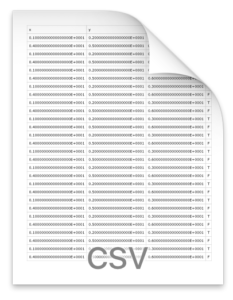Fortran CSV Module

The lowly CSV (comma-separated values) file never gets any respect. Sure, it isn't really standardized, but it is a very useful text file format for columns of data, and is frequently encountered in science/engineering fields. Of course, there is no good modern Fortran library for reading and writing CSV files (see [1-2] for some older Fortran 90 code for writing only). Searching the internet (e.g., [3-4]) you will find various ad hoc suggestions for handling these files. It's amazing how little Fortran users expect their language to support non-numerical algorithms. No Fortran programmer would ever suggest that someone roll their own matrix inverse routine, but they don't see anything wrong with having to write their own data file parser (if you told a Python user they had to write their own CSV parser, you'd be laughed out of the place).
So, I created fortran-csv-module (now available on GitHub), a modern Fortran library for reading and writing CSV files. Everything is handled by an object-oriented csv_file class. Here is an example for writing a file:
program csv_write_test
use csv_module
use iso_fortran_env, only: wp => real64
implicit none
type(csv_file) :: f
logical :: status_ok
! open the file
call f%open('test.csv',n_cols=4,status_ok=status_ok)
! add header
call f%add(['x','y','z','t'])
call f%next_row()
! add some data:
call f%add([1.0_wp,2.0_wp,3.0_wp],real_fmt='(F5.3)')
call f%add(.true.)
call f%next_row()
call f%add([4.0_wp,5.0_wp,6.0_wp],real_fmt='(F5.3)')
call f%add(.false.)
call f%next_row()
! finished
call f%close(status_ok)
end program csv_write_test
Which produces the following file:
x,y,z,t 1.000,2.000,3.000,T 4.000,5.000,6.000,F
Real, integer, logical, or character data can be added as scalars, vectors, and matrices.
When reading a CSV file, the data is stored internally in the class as allocatable character strings, which can be retrieved as real, integer, logical or character vectors as necessary. For example, to get the x, y, z, and t vectors from the previously-generated file:
program csv_read_test
use csv_module
use iso_fortran_env, only: wp => real64
implicit none
type(csv_file) :: f
character(len=30),dimension(:),allocatable :: header
real(wp),dimension(:),allocatable :: x,y,z
logical,dimension(:),allocatable :: t
logical :: status_ok
integer,dimension(:),allocatable :: itypes
! read the file
call f%read('test.csv',header_row=1,status_ok=status_ok)
! get the header and type info
call f%get_header(header,status_ok)
call f%variable_types(itypes,status_ok)
! get some data
call f%get(1,x,status_ok)
call f%get(2,y,status_ok)
call f%get(3,z,status_ok)
call f%get(4,t,status_ok)
! destroy the file
call f%destroy()
end program csv_read_test
Various options are user-selectable for specifying the format (e.g., changing the quote or delimiter characters). You can choose to enclose strings (or all fields) in quotes or not. The library works pretty well, and there are probably additional improvements that could be made. For one thing, it doesn't properly handle the case of a string that contains the delimiter character (I'll eventually fix this). If anybody has any other improvements, fork it and send me a pull request. The license is BSD, so you can use it for whatever you want.
See also
- J. Burkardt, CSV_IO -- Read and Write Comma Separated Values (CSV) Files. [note: it doesn't actually contain any CSV reading capability]
- A. Markus, FLIBS -- Includes a csv_file module for writing CSV files.
- How to read a general csv file [Intel Fortran Forum]
- Read data from a .csv file in fortran [Stack Overflow]